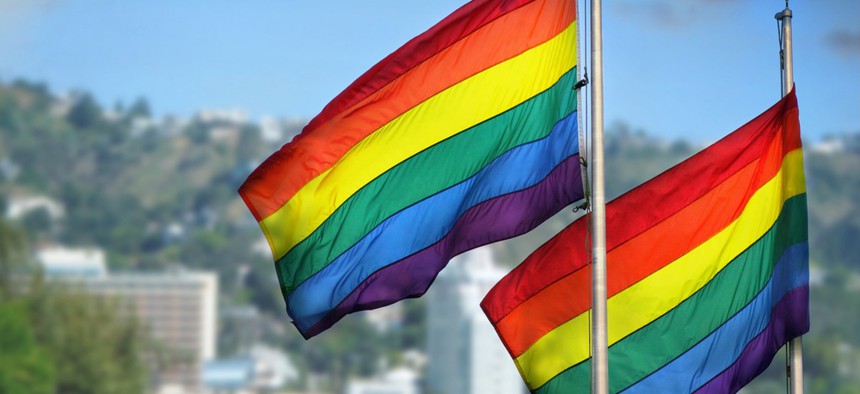Same-Sex Marriage Returns to the Supreme Court

CURAphotography / Shutterstock.com

Connecting state and local government leaders
The justices will hear a challenge to state laws banning same-sex marriage.
The Supreme Court will tackle another landmark case on same-sex marriage, opening the door to a ruling that could bring marriage equality to all 50 states in just a matter of months.
The justices on Friday agreed to hear a challenge to state laws banning same-sex marriage and refusing to recognize same-sex marriages performed in other states. After the court's initial steps toward marriage equality two years ago, this case asks the justices to go all the way: declaring a constitutional right to marry.
The court set aside two and a half hours for oral arguments (most cases only get an hour). Arguments have not yet been scheduled but will probably happen in April, followed by a ruling in late June or early July.
The outcome will likely come down to Justice Anthony Kennedy, who wrote the court's 2013 decisions striking down part of the federal Defense of Marriage Act and clearing the way for same-sex marriage in California.
But while Kennedy has put the court's stamp of approval on the concept of marriage equality, the latest case will test how far the justices are willing to go, and how quickly—in effect, whether they're ready to legalize same-sex marriage nationwide.
The case the justices agreed to hear Friday is an appeal from the 6th Circuit Court of Appeals, which in November upheld restrictions on same-sex marriage in Kentucky, Michigan, Ohio, and Tennessee.
Rather than limiting itself to the specifics of any one state's marriage ban, the court pulled together appeals from all four states.
And while the court's last case on state marriage laws was tangled up in procedural issues, this time the justices presented the fundamental constitutional questions head-on: Does the 14th Amendment "require a state to license a marriage between two people of the same sex," and does it " require a state to recognize a marriage between two people of the same sex when their marriage was lawfully licensed and performed out-of-state?"
In a 2-1 decision, the 6th Circuit said states have the power to set their own definition of marriage and to decide for themselves which out-of-state marriages they will recognize. Judge Jeffrey Sutton, writing for the majority, said the courts should defer to the democratic process.
"When the courts do not let the people resolve new social issues like this one, they perpetuate the idea that the heroes in these change events are judges and lawyers. Better in this instance, we think, to allow change through the customary political processes, in which the people, gay and straight alike, become the heroes of their own stories," Sutton wrote.
The 6th Circuit, though, is the only federal appeals court to reach that conclusion. Four other circuit courts have ruled that state bans on same-sex marriage violate couples' fundamental rights. And advocates for marriage equality—as well as many impartial observers—feel confident that the Supreme Court will agree.
In overturning states' marriage laws, a number of federal courts have cited the Supreme Court's 2013 decision striking down part of the Defense of Marriage Act. Although that ruling applied only to the federal law, and did not directly say whether state marriage laws are unconstitutional, lower courts took the hint from Kennedy's rhetoric in the case.
Kennedy wrote that the law was an affront to the "dignity" of gay couples, saying it "instructs all … persons with whom same-sex couples interact, including their own children, that their marriage is less worthy than the marriages of others."
If that was the problem with federal rules on same-sex marriage, several lower courts have said, it's hard to see states' marriage bans any differently.
And while lower courts have been reaching that interpretation and expanding same-sex couples' marriage rights, the high court has stayed on the sidelines—another promising sign for advocates.
The justices said this past October that they would not hear appeals in several cases where states' marriage bans were struck down. Their inaction allowed those rulings to take effect and same-sex marriage to expand; 36 states now allow same-sex couples to marry.
The Supreme Court got involved only after the 6th Circuit broke with the trend, becoming the only federal appeals court to uphold a state ban on same-sex marriage. That ruling created a legal split as well as a real-world imbalance in marriage rights, all but forcing the high court to step in.
"After decades of debate and litigation, we have made the case for the freedom to marry already; the justices—like the American people—no doubt already know the answer, and it's time now to bring the country to national resolution," Evan Wolfson, the founder and president of the advocacy group Freedom to Marry, said before the court announced that it would hear the appeal.
NEXT STORY: Driverless Car Test Districts Are Coming




